 Let’s talk sugar. Such a hefty topic. I do have lot to say on this, but I will keep it as simple as possible. For those of you who are Keto or Paleo dieting, you have extremely reduced sugar intake, but in case you hit diet bottom and find yourself back on the sugar train, this article will help.
Let’s talk sugar. Such a hefty topic. I do have lot to say on this, but I will keep it as simple as possible. For those of you who are Keto or Paleo dieting, you have extremely reduced sugar intake, but in case you hit diet bottom and find yourself back on the sugar train, this article will help.
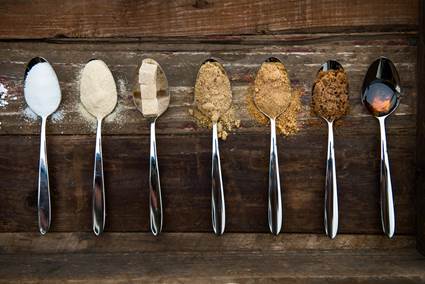
The average American consumes around 22 teaspoons of added sugars every day. That’s more than 88 g of sugar or nearly 352 calories. Approximately one-half of that sugar comes from sugar-sweetened beverages, such as sodas, energy drinks, sports drinks, fruit drinks, and teas. Grain-based desserts, such as cakes and cookies, also are big contributors.
You might be wondering how much sugar a day is healthy? There are many different recommendations from a variety of respected health organizations. I choose to go with the simplest which is from the 2015 Dietary Guidelines for Americans, which is no more than 10% of your intake from added sugars if you are on a 2000kcal diet (so basically 200kcals of added sugars). And when you’re feeling ready, you can drop down to the World Health Organization recommendation of 5% of your intake per day.
What’s The Problem With Too Much Added Sugar?
High intakes of added sugars, particularly sugary drinks, are associated with obesity. That’s settled science – and obesity is a primary risk factor for cardiovascular disease.
Being overweight increases risk of high blood pressure, atherosclerosis, and diabetes, conditions which all raise the risk of CVD. Also, independent of weight, too much added sugar increases triglyceride levels, total and LDL cholesterol, and blood pressure.
Not only that… high added sugar intake is associated with increased inflammation and oxidative stress (also linked to atherosclerosis which leads to artery-hardening plaque).
AND recently I learned that a diet high in added sugar reduces the production of a brain chemical known as brain-derived neurotrophic factor (BDNF). Without BDNF, our brains can’t form new memories and we can’t learn (or remember) much of anything. Levels of BDNF are particularly low in people with an impaired glucose metabolism—diabetics and pre-diabetics—and as the amount of BDNF decreases, sugar metabolism worsens. Low BDNF is also linked to Dementia, Alzheimer’s, and Depression.
I will stop there. Just know it’s a scary cascade. But please keep in mind this is excess added sugar intake, not moderate.
Added Versus Naturally Occurring:
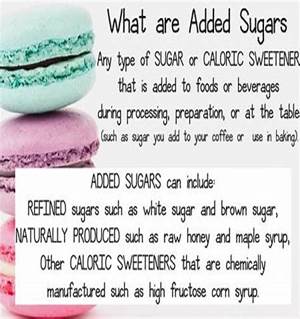
I want to emphasize the difference between ADDED sugar and NATURALLY occurring sugar. Added sugars are any type of sugar or caloric sweetener that is added to foods or beverages at any point in time (processing, preparation, or at the table). Added sugars include the refined stuff like white or brown sugar, naturally produced sugar such as honey or agave, and other calorie sweeteners that are highly processed and chemically such as high fructose corn syrup. Our lovely little nutrient labels are beginning to all parse out total sugars and added sugars (but not all of the companies have caught up).
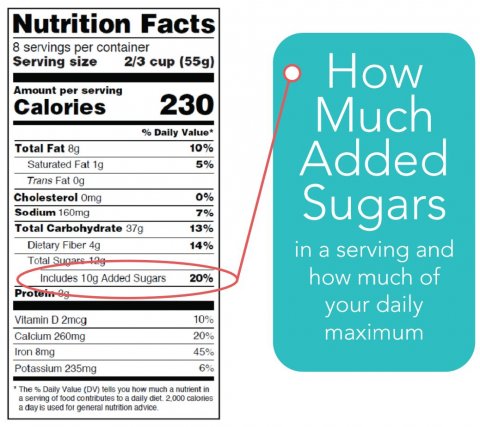
All the photos above can give you a visual of exactly what I’m talking about.
So swapping out table sugar for honey won’t make much of a difference on your blood sugar. However, why take in added bleach? Yuk.
What about how your body reacts to sugar, and is there healthy sugar? Added and naturally occurring sugars act the same in your body if you were to isolate the sugar. However, food containing naturally occurring sugar often has other nutrients that impact how your body breaks it down. For example, an apple contains naturally occurring sugar, but it also has fiber, which slows digestion. Your body will experience less of a blood-sugar spike after you eat an apple than if you had, say, a soda. (Even better if you add in a healthy fat like nut butter, which can further slow digestion). For another example, the protein in yogurt, milk, and other dairy products that contain lactose can help your body take more time to process the sugar.
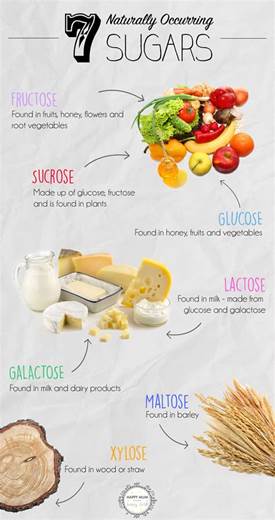
To Be Clear Don’t Worry About The Sugar Innately In These Foods (but always check ingredients):
- Dairy
- Fruit
- Vegetables
- Grains
Look at the image above to see which sugars are naturally in these items. Grains can be tricky because a lot of the time there are added sugars to these, so read ingredients. Innately occurring or naturally occurring sugar will not be listed in ingredients, only ADDED ingredients.
Here is a List of Most Added Sugars:
| Agave nectar | Evaporated cane juice | Malt syrup |
| Brown sugar | Fructose | Maple syrup |
| Cane crystals | Fruit juice concentrates | Molasses |
| Cane sugar | Glucose | Raw sugar |
| Corn sweetener | High-fructose corn syrup | Sucrose |
| Corn syrup | Honey | Syrup |
| Crystalline fructose | Invert sugar | |
| Dextrose | Maltose |
If You Go For Added Sugar My Bets Are On:
- Honey
- Date Sugar
- Maple Syrup
- Molasses
- Coconut Palm Sugar
Honey because it may fight bacteria growth, help soothe sore throats, and ease inflammation (to name a few benefits). Choose the organic, raw, and more local kind. Date sugar because it’s simply dried dates ground into a fine powder and has the nutrients of whole dates, including potassium, calcium, and antioxidants. It has 500 to 600 times more antioxidants than table sugar. Natural maple syrup because it has vitamins, minerals, amino acids, organic acids, phytohormones, and phytonutrients. Molasses, especially the dark and blackstrap variety, because it contains calcium, potassium, magnesium, and antioxidants. Coconut palm sugar because it contains (although small amounts – but it’s better than table sugar) inulin (fiber), iron, calcium, magnesium, and potassium. Just make sure you really understand the first part of this article when discussing consuming too much added sugar.
You might be wondering why Agave Nectar didn’t make the cut. I actually have this in my cupboard, but there is more and more research that is making me question it. It does impact the blood sugar less (lower glycemic index) but it is pretty processed with a high percentage of fructose. High-fructose diets may increase insulin resistance, triglyceride levels, inflammation, and the risk of metabolic syndrome. I do think of course a little is just fine and not to freak out too much about it, especially when used infrequently.
Sugar Substitutes (I have highlighted and linked the ones I’m down with):
- Aspartame (e.g., Equal®, Nutrasweet®, and Canderel®)
- Acesulfame-K (e.g., Sweet One® and Sunett®)
- Monk Fruit
- Saccharin (e.g., Sweet ‘N Low® and Sugar Twin®)
- Stevia
- Sucralose (e.g., Splenda)
- Cyclamate
- Alitame
- Neotame
- Neo-DHC: Approved in the United States as a “flavor enhancer” only
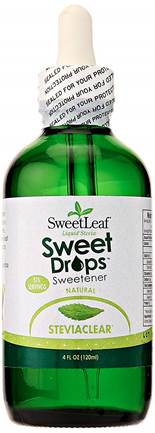
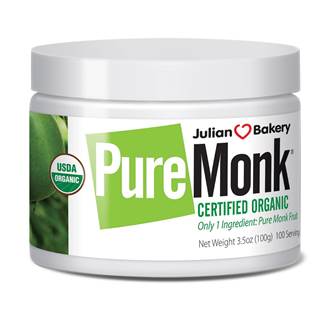
Sugar Alcohols (I have highlighted and linked the one I’m down with):
- Sorbitol
- Xylitol
- Maltitol
- Isomalt
- Lactitol
- Tagatose (Galactose and Sucralose)
- Mannitol
- Erythritol
- Glycerol
- Hydrogenated Starch
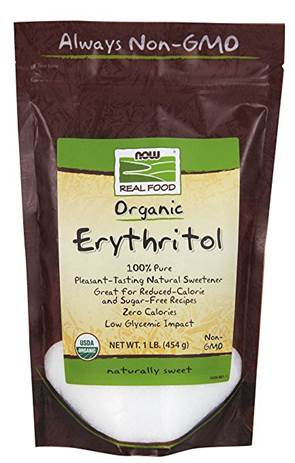
How to Substitute Alternative Sweeteners:
| Sweetener | For 1 cup of table sugar, use: | Notes |
| Maple syrup | 3/4 cup | Per cup of sugar replaced: Reduce liquid by 2 T. |
| Honey | 3/4 cup | Per cup of sugar replaced: Reduce liquid by 2 T and lower oven temperature by 25° F. |
| Date sugar | 2/3 cup | Does not melt. Use along with other sugar when baking. |
| Coconut sugar | 1 cup | None |
| Stevia | 1 cup | In baking, don’t replace more than one-half of the sugar in the recipe with stevia sweetener, per InTheRaw.com. |
| Monk fruit | 1 cup | In baking, don’t replace more than one-half of the sugar in the recipe with monk fruit sweetener, per InTheRaw.com. |
Is Sugar Addictive?
If you are dieting or under any kind of restriction with food, then you can 100% feel out of control with sugar (and other food for that matter). You are triggering your primitive brain to eat high sugar high fat foods. Take away the ban on foods (including sugar) and the food holds less power, right? It’s no longer as tantalizing. Here’s an example of intuitive versus diet mentality. I put many foods on my son’s plate (he’s 19 months) including cookies (albeit nutritious but plenty of sugar) and he nibbles a little on the cookie, takes a bite of his tofu, plays with his blueberries, and noshes on his dried cheesy kale. This is how he eats. No rules. Now, if there was actual sugar addiction, wouldn’t you see him scarfing down the cookie and begging for more?? So… I know there is some brain chemistry involved with eating sugar and fat that can trigger a serotonin release, but to what extent I’m not sure. Also, if that is all you eat and what you are accustomed to, your tastebuds will be geared for that much sugar – so you will seek it out. That makes sense to me. So it seems there is some strategy to not set up for desiring an abundance of sugar with limiting excess exposure and keeping more wholesome delicious foods around that are closer to nature. Make sense?
Now that we had our sugar talk, know that you can still eat sugar. Remember the more we ban foods and put moral value on foods the more we want them. Keep all food neutral no matter how much it can harm you in large quantities. It’s psychologically important to do that. Just be mindful if you’re using it to cope with emotions.
Keep it real,
Miriam Turner
Studio SWEAT Dietitian / Intuitive Eating Counselor
Resources:
- https://www.psychologytoday.com/intl/blog/neuronarrative/201204/what-eating-too-much-sugar-does-your-brain
- https://www.hsph.harvard.edu/nutritionsource/carbohydrates/added-sugar-in-the-diet/
- https://www.cnn.com/2018/01/15/health/honey-health-benefits/index.html
- https://www.webmd.com/diet/features/the-truth-about-agave
- https://rebelrd.com/natural-sweeteners/
- https://www.todaysdietitian.com/newarchives/0718p16.shtml








Comments - 3